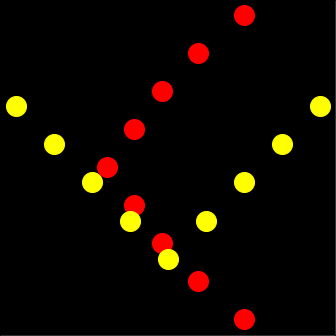Check out ClustVizGUI, too
The aim of ClustViz is to visualize every step of each clustering algorithm, in the case of 2D input data.
The following algorithms have been examined:
-
OPTICS
-
DBSCAN
-
HDBSCAN
-
SPECTRAL CLUSTERING
-
HIERARCHICAL AGGLOMERATIVE CLUSTERING
- single linkage
- complete linkage
- average linkage
- Ward's method
-
CURE
-
BIRCH
-
PAM
-
CLARA
-
CLARANS
-
CHAMELEON
-
CHAMELEON2
-
DENCLUE
Documentation: click here
Install with
pip install clustvizTo run BIRCH algorithm, the open source visualization software Graphviz is required. Install Graphviz from the official webpage (https://graphviz.gitlab.io/download/) or using HomeBrew, then modify the PATH variable as follows (replace the string according to the path where you installed Graphviz):
import os
# on Windows usually
os.environ["PATH"] += os.pathsep + 'C:/Program Files (x86)/Graphviz2.38/bin'
# on MacOS usually
os.environ["PATH"] += os.pathsep + '/usr/local/bin'To run CHAMELEON and CHAMELEON2 algorithms, the METIS library is required. To install it on macOS, execute the following commands (partially taken from here):
# download the file using wget (do it from the website if you prefer)
wget http://glaros.dtc.umn.edu/gkhome/fetch/sw/metis/metis-5.1.0.tar.gz
# uncompress it
gunzip metis-5.1.0.tar.gz
# untar it
tar -xvf metis-5.1.0.tar
# remove the tar
rm metis-5.1.0.tar
# go inside the folder
cd metis-5.1.0
# install it using make
make config shared=1
make install
# export the dll
export METIS_DLL=/usr/local/lib/libmetis.dylibTo install METIS on Windows, go to conda-metis and follow the instructions.
Let's see a basic example using OPTICS:
from clustviz.optics import OPTICS, plot_clust
from sklearn.datasets import make_blobs
# create a random dataset
X, y = make_blobs(n_samples=30, centers=4, n_features=2, cluster_std=1.8, random_state=42)
# perform OPTICS algorithm, with plotting enabled
ClustDist, CoreDist = OPTICS(X, eps=2, minPTS=3, plot=True, plot_reach=True)
# plot the final clusters
plot_clust(X, ClustDist, CoreDist, eps=2, eps_db=1.9)For many other examples, take a look at the detailed clustviz_example notebook.
- The folder
data/DOCUMENTScontains all the official papers, PowerPoint presentations and other PDFs regarding all the algorithms involved and clustering in general. - The folder
clustvizcontains the scripts necessary to run the clustering algorithms. - The notebook
data/clustviz_example.ipynblets the user run every algorithm on 2D datasets; it contains a subsection for every algorithm, with the necessary modules and functions imported and some commented lines of code which can be uncommented to run the algorithms. - The folder
docscontains the necessary files to build the documentation using Sphinx and ReadTheDocs. - The folder
testscontains pytest tests.
I did not start to write the scripts for each algorithm from scratch; in some cases I modified some Python libraries, in other cases I took some publicly available GitHub repositories and modified the scripts contained there. The following list provides all the sources used when I did not write all the code by myself:
-
SPECTRAL CLUSTERING http://dx.doi.org/10.1007/s11222-007-9033-z
-
BIRCH https://github.com/annoviko/pyclustering/blob/master/pyclustering/cluster/birch.py
-
PAM https://github.com/SachinKalsi/kmedoids/blob/master/KMedoids.py
-
CLARA https://github.com/akalino/Clustering/blob/master/clara.py
-
CLARANS https://github.com/annoviko/pyclustering/blob/master/pyclustering/cluster/clarans.py
The other algorithms have been implemented from scratch following the relative papers. Thanks to Darius (https://github.com/dariomonici), the GUI Meister, for the help with PyQt5, used for ClustVizGUI.
- add more clustering algorithms
- comment every code block and improve code quality
- pymetis doesnt work on Windows, but could be an option for macOS
- add highlights to docstrings using ``
- show aliases typehints using Sphinx (open issue)
- if Travis CI doesn't trigger, it is probably because
.travis.ymlisn't properly formatted. Useyamllintto correct it - add package update
- for the deployment phase: brew install ruby, brew install travis
- added empty conftest.py in clustviz folder for tests in Windows version


